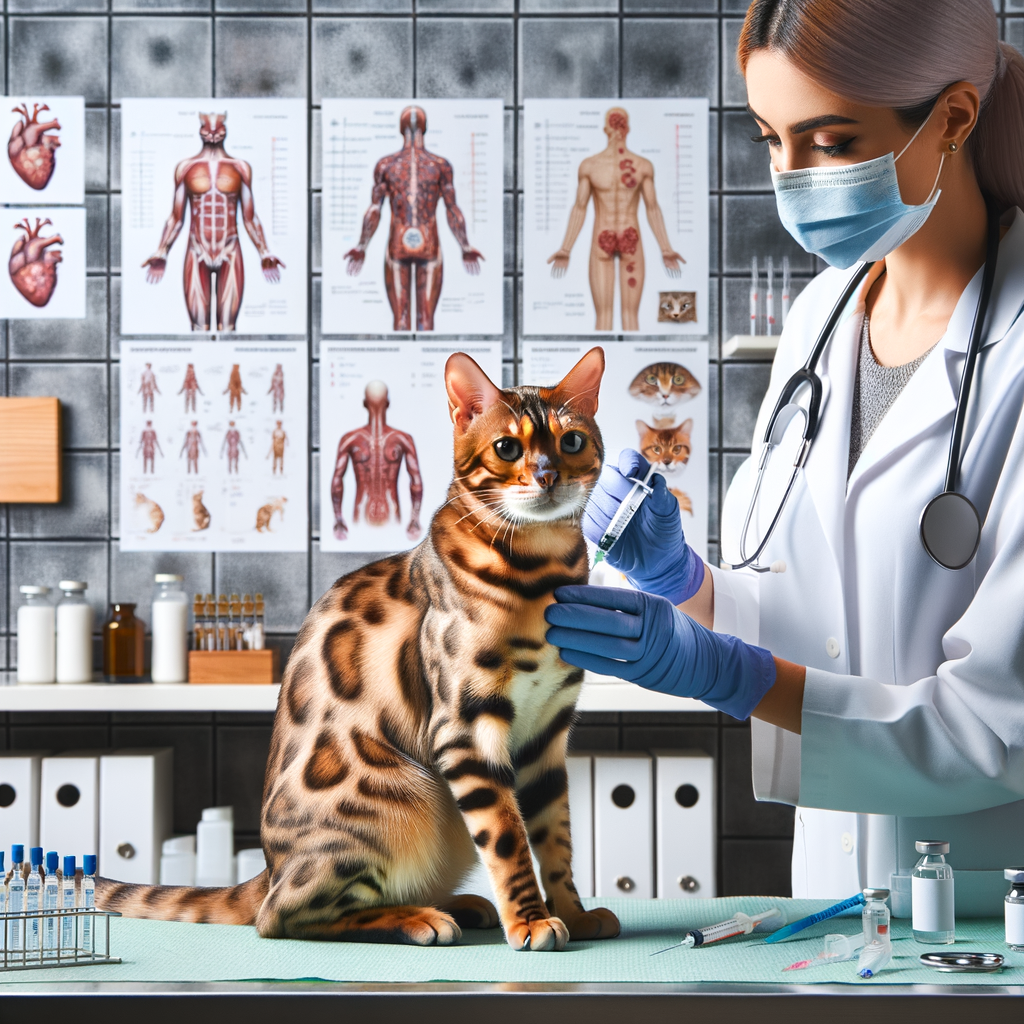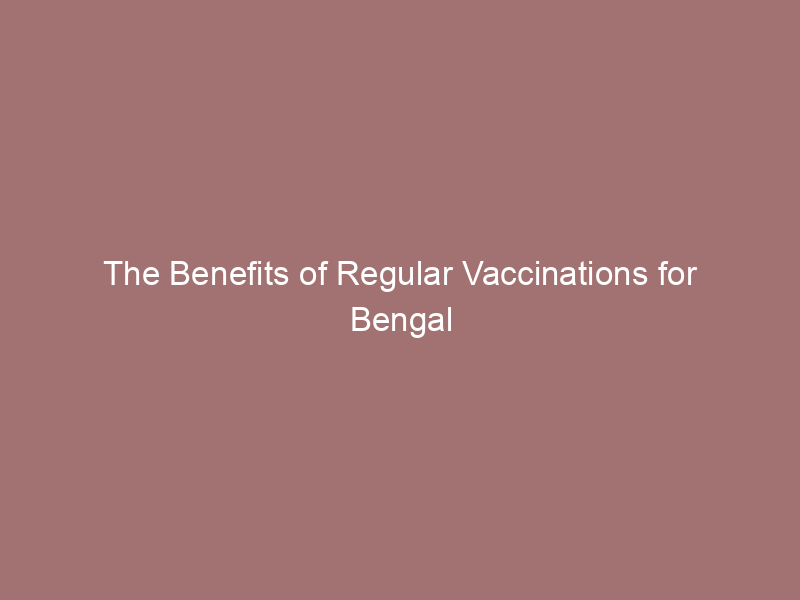
The Benefits of Regular Vaccinations for Bengal Cats: An Overview
Vaccinations are crucial for keeping your Bengal cat healthy and safe. They help protect against common and serious diseases. Regular vaccines ensure your cat’s immune system is strong and ready to fight off infections.
- Bengal cat health benefits from vaccinations:
Vaccinated Bengal cats are less likely to suffer from illnesses. This means fewer trips to the vet and a happier, healthier cat. Vaccinations can also prevent the spread of diseases to other pets and humans.
- Preventing diseases in Bengal cats through immunization:
Immunization helps prevent diseases like feline leukemia, rabies, and feline distemper. These diseases can be deadly, but vaccines provide a shield of protection. By keeping up with regular vaccinations, you ensure your Bengal cat stays disease-free.
Understanding Bengal Cat Vaccinations
What are Bengal Cat Vaccinations?
- Definition and purpose of Bengal cat vaccinations:
Vaccinations are shots given to Bengal cats to help protect them from various diseases. These vaccines work by stimulating the cat’s immune system to fight off infections. The main purpose is to keep your Bengal cat healthy and safe from illnesses that can be serious or even deadly.
- Types of vaccines for Bengal cats:
There are several types of vaccines that Bengal cats need. The core vaccines include those for Feline Panleukopenia (FPV), Feline Herpesvirus (FHV-1), and Feline Calicivirus (FCV). Non-core vaccines, which are given based on the cat’s lifestyle and risk, include those for Feline Leukemia Virus (FeLV) and Rabies.
Bengal Cat Immunization Schedule
-
First Round of Vaccinations
The first round of vaccinations for Bengal kittens usually starts at 6-8 weeks old. These initial shots are crucial for protecting your kitten from common diseases.
Key vaccines include:
- Feline Viral Rhinotracheitis (FVR): Protects against respiratory infections.
- Calicivirus: Prevents another type of respiratory infection.
- Panleukopenia (FPV): Also known as feline distemper, this is a severe and often fatal disease.
-
Follow-up Vaccinations
Follow-up vaccinations, also known as booster shots, are given every 3-4 weeks until the kitten is about 16 weeks old. These boosters help to ensure that the initial vaccines are effective.
Important follow-up vaccines include:
- Rabies: Usually given at 12-16 weeks, this vaccine is essential for preventing rabies.
- Feline Leukemia Virus (FeLV): Recommended for kittens that will go outdoors or be around other cats.
-
Annual Booster Shots
After the initial series of vaccinations, Bengal cats need annual booster shots to maintain their immunity. These yearly shots are vital for ongoing health and protection.
Annual boosters typically include:
- FVRCP: A combination vaccine that protects against Feline Viral Rhinotracheitis, Calicivirus, and Panleukopenia.
- Rabies: Required by law in many areas and crucial for your cat’s safety.
Bengal Cat Health Benefits from Regular Vaccinations
- Longer lifespan: Regular vaccinations help Bengal cats live longer. Vaccines protect them from deadly diseases, ensuring they stay healthy for many years.
- Prevention of common Bengal cat illnesses: Vaccinations prevent common illnesses like feline distemper, feline herpesvirus, and calicivirus. These diseases can be very harmful, but vaccines keep your Bengal cat safe.
- Improved overall wellness: When Bengal cats are vaccinated, they are less likely to get sick. This means they have more energy, better appetite, and a happier life. Regular vaccinations contribute to their overall well-being.
Preventing Diseases in Bengal Cats through Vaccinations
Common Diseases Prevented by Vaccines
Vaccinations play a crucial role in keeping Bengal cats healthy. Here are some common diseases that can be prevented through regular vaccinations:
- Feline Leukemia Virus (FeLV): FeLV is a serious disease that affects a cat’s immune system. It can lead to severe illness and even death. Vaccinating your Bengal cat against FeLV can help protect them from this dangerous virus.
- Feline Immunodeficiency Virus (FIV): FIV is similar to HIV in humans and weakens a cat’s immune system. Vaccinating your Bengal cat can help prevent this disease, ensuring they stay healthy and strong.
- Rabies: Rabies is a deadly virus that can affect both cats and humans. Vaccinating your Bengal cat against rabies is not only essential for their health but also a legal requirement in many places.
Bengal Cat Veterinary Care: Beyond Vaccinations
While vaccinations are crucial for your Bengal cat’s health, there are other important aspects of veterinary care to consider. Let’s explore some key areas that go beyond vaccinations.
-
Regular Check-ups
Regular check-ups are essential for keeping your Bengal cat healthy. These visits help catch any potential health issues early. Your vet will check your cat’s weight, teeth, and overall health. It’s a good idea to schedule a check-up at least once a year.
-
Diet and Nutrition
A balanced diet is vital for your Bengal cat’s well-being. Bengals are active cats and need high-quality food to stay healthy. Make sure their diet includes the right mix of proteins, fats, and carbohydrates. Always provide fresh water, and consult your vet for dietary advice.
-
Exercise and Mental Stimulation
Bengal cats are known for their high energy levels. They need plenty of exercise and mental stimulation to stay happy. Provide toys, climbing trees, and interactive playtime. Regular exercise helps prevent obesity and keeps their minds sharp.
| Aspect | Importance | Frequency |
|---|---|---|
| Regular Check-ups | Early detection of health issues | At least once a year |
| Diet and Nutrition | Maintains overall health | Daily |
| Exercise and Mental Stimulation | Prevents obesity and boredom | Daily |
Protecting Bengal Cats from Illnesses: A Comprehensive Vaccination Guide
Choosing the Right Vet for Your Bengal Cat
Choosing the right vet is crucial for your Bengal cat’s health. Here are some key factors to consider and questions to ask potential vets.
- Factors to consider:
- Experience with Bengal Cats: Ensure the vet has experience treating Bengal cats. These cats have unique needs.
- Location: Choose a vet clinic that is conveniently located. This makes it easier for regular visits.
- Clinic Hours: Check if the clinic hours fit your schedule. Some clinics offer weekend or evening hours.
- Emergency Services: Find out if the clinic offers emergency services or has a referral system for emergencies.
- Cost: Compare the costs of services. Make sure they fit your budget without compromising quality.
- Questions to ask potential vets:
- What experience do you have with Bengal cats? This helps you understand their familiarity with the breed.
- What vaccinations do you recommend for Bengal cats? Ensure they follow the latest guidelines for cat vaccinations.
- Do you offer a wellness plan? Some vets offer plans that include vaccinations, check-ups, and more.
- How do you handle emergencies? Knowing their emergency protocols can give you peace of mind.
- Can you provide references? Speaking with other Bengal cat owners can provide insights into the vet’s care quality.
Preparing Your Bengal Cat for Vaccinations
-
Pre-vaccination Check-up
Before your Bengal cat gets vaccinated, a pre-vaccination check-up is essential. This visit helps the vet ensure your cat is healthy enough for the vaccine. During the check-up, the vet will:
- Examine your cat’s overall health
- Check for any signs of illness
- Discuss your cat’s medical history
It’s important to share any concerns you have about your cat’s health during this visit.
-
What to Expect During the Vaccination
Vaccination day can be a bit stressful for both you and your Bengal cat. Knowing what to expect can make it easier. Here’s a quick rundown:
- The vet will clean the injection site.
- Your cat will receive the vaccine, usually via a small needle.
- The process is quick and typically painless.
Most cats handle vaccinations well, but it’s normal for them to feel a bit uneasy.
-
Post-vaccination Care
After the vaccination, your Bengal cat might need some extra care. Here are some tips:
- Keep an eye on the injection site for any swelling or redness.
- Monitor your cat for any unusual behavior, like lethargy or loss of appetite.
- Provide a quiet and comfortable space for your cat to rest.
If you notice any severe reactions, contact your vet immediately.
Final Thoughts
Regular vaccinations are essential for maintaining the health and well-being of Bengal cats, protecting them from a range of preventable diseases. Pet owners can ensure their feline companions enjoy a long, healthy, and active life by staying up-to-date with vaccinations. Let’s prioritize regular veterinary care and vaccinations to safeguard our Bengal cats and provide them with the best possible quality of life.






